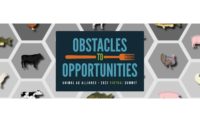Rethink methane and change the narrative around animal agriculture and the environment at 2021 Virtual Summit

Greenhouse gas emissions from livestock and the sustainability of our current food system are generating quite the media buzz, especially with the United Nations gearing up for its Food Systems Summit later this year. University of California, Davis’ Frank Mitloehner, PhD, will provide insights into why we should be rethinking methane and animal agriculture’s role in reaching climate neutrality at the Animal Agriculture Alliance’s 2021 Virtual Stakeholders Summit.
The Alliance’s annual Summit brings together thought leaders in the agriculture and food industries to discuss hot-button issues and out-of-the-box ideas to connect everyone along the food chain, engage influencers and protect the future of animal agriculture. The 2021 event, themed “Obstacles to Opportunities,” is scheduled for May 5-6 with preconference webinars planned for the five business days prior, beginning Wednesday, April 28.
The Virtual Summit agenda featuring the exciting and high-caliber speakers you will see at the 2021 event has been posted on the Virtual Summit registration website. Sessions will highlight ways to position animal agriculture as a path forward to climate neutrality, how to elevate the voices of farmers in dialogues surrounding food and agriculture, and strategies for virtual stakeholder and influencer engagement.
Animal agriculture is often villainized as a climate change culprit, but what is viewed as its Achilles' heel may actually be one of our best climate solutions. That’s because we’ve been looking at methane from livestock all wrong, according to Dr. Mitloehner. By rethinking methane, Dr. Mitloehner will show that animal agriculture’s impact on global warming has not only been exaggerated but its ability to capture carbon from the atmosphere is underappreciated. Efficiencies and technology have put the animal agriculture sector on the path to climate neutrality – and likely toward climate change solutions.
“Dr. Mitloehner’s research on the relationship between animal agriculture and climate change is truly fascinating,” said Kay Johnson Smith, Alliance president and CEO. “For years, livestock have been targeted and demonized for their methane emissions, and now we have the opportunity to change the narrative and position animal agriculture as a solution to reducing our environmental footprint and improving our planet for generations to come.”
Dr. Mitloehner is a professor and air quality specialist in cooperative extension in the Department of Animal Science at UC Davis. As such, he shares his knowledge and research, both domestically and abroad, with students, scientists, farmers and ranchers, policymakers, and the public at large. Dr. Mitloehner is also director of the CLEAR Center, which has two cores – research and communications. The CLEAR Center brings clarity to the intersection of animal agriculture and the environment, helping our global community understand the environmental and human health impacts of livestock, so we can make informed decisions about the foods we eat, while reducing environmental impacts. He is passionate about understanding and mitigating air emissions from livestock operations, as well as studying the implications of these emissions on the health of farm workers and neighboring communities. In addition, he is focusing on the food production challenge that will become a global issue as the world’s population grows to nearly 10 billion by 2050. Frank received a Master of Science degree in animal science and agricultural engineering from the University of Leipzig, Germany, and a doctoral degree in animal science from Texas Tech University.
Be sure to check the Virtual Summit website for the most up-to-date information and to register. You can also follow the hashtag #AAA21 for periodic updates about the event. For general questions about the Summit please contact summit@animalagalliance.org or call (703) 562-5160.
Source: Animal Agriculture Alliance
Looking for a reprint of this article?
From high-res PDFs to custom plaques, order your copy today!






